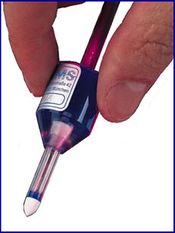Difference between revisions of "Soil matric potential - tensiometer (T5)"
Jump to navigation
Jump to search
m |
(→Links) |
||
| (2 intermediate revisions by one other user not shown) | |||
| Line 1: | Line 1: | ||
| + | [[Image:T5-tensiometer.jpg|right|175px|]] | ||
| + | |||
==Parameter to be measured:== | ==Parameter to be measured:== | ||
Soil matric potential | Soil matric potential | ||
| Line 29: | Line 31: | ||
==Links== | ==Links== | ||
Projects that used the above equipment: | Projects that used the above equipment: | ||
| − | + | EPFL erosion | |
Other related web sites: | Other related web sites: | ||
| − | + | *http://www.ums-muc.de/fileadmin/produkt_downloads/Tensiometer/T5_Datasheet.pdf | |
| − | *http://www.ums-muc.de/fileadmin/produkt_downloads/Tensiometer/T5_Datasheet.pdf | ||
| − | |||
==References== | ==References== | ||
Latest revision as of 12:58, 7 November 2013
Parameter to be measured:
Soil matric potential
Method:
Tensiometer
Equipment:
T5
Advantages:
- Small
- Very fast response
- Great resolution when used with the DL6-te Tensiometer Data logger
- Reliable
Disadvantages:
- Their small size makes them great for laboratory or flume experiments but less appropriate for field measurements.
- They have to be taken out of the soil to refill them.
What to watch out for:
- Don’t burry them too deep - you will have to dig them out (and thus disturb the soil again) if you need to refill them.
Problems/Questions:
Links
Projects that used the above equipment: EPFL erosion
Other related web sites:
